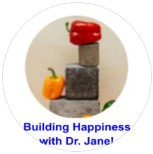Can Happiness be built?
Happiness is the well-being of our life, just like health is the well-being of our body.
So YES, just like we can build up our body muscles, or health in general, we can build happiness by taking actions to improve its elements and its whole.
To improve our health, we resort on medical advice and health practices. But to improve our happiness, we had been largely left to our own device, without much knowledge nor guidance.
This is until fairly recently, when Positive Psychology, also called “the science of happiness”, was founded at the turn of the millennium.
Positive Psychology and other well-being sciences use scientific methods to study happiness.
These studies have greatly increased our understand about happiness.
They also have developed an increasing number of tested-and-true methods to help cultivating happiness.
So now, we are confident that not only happiness can be improved, but we also have sufficient knowledge and research-proven methods to effectively improve happiness.
However, these knowledge and methods are not well-known to most people.
If educated with the knowledge and trained to master the methods, anyone will have the potential of becoming happier.
That is the purpose of this Substack.
As a PhD behavioral scientist, I have been focusing on happiness research and well-being coaching for nearly three decades. During this time, it becomes clear that while everyone wants to be happy, there is much misconception and misunderstanding about happiness, as well as, for most people, lack of effective skills for improving happiness.
So, I feel strongly that in addition to research about happiness and coaching one-on-one or in small group on practical skills, more social engagement is also needed for spreading the knowledge and coaching the skills at a much broader scale to benefit the general public.
That’s the rationale of this Substack.
In this Substack, I will introduce to subscribers and other readers the science-based knowledge and research-proven methods for building happiness and improving well-being.
Group and/or individual coaching and related services will also be available to subscribers.
Adding to the breadth of the knowledge and skills taught here, we may also resort to my extensive training and research experiences in physiology and public health (one master’s degree in each), which gave me solid understandings of the physiological as well as social factors affecting happiness. These should help us use a comprehensive approach in our knowledge and skill building.
In time, it is hope that these efforts will benefit an increasingly larger number of people, and though whom and their improved happiness, benefit a wider public.
But overall, I would most like to build a community here that we could all work together to build and enjoy happiness! You are warmly welcome to join us!
Why subscribe?
Subscribe to join the community for building happiness under the professional guidance of Dr. Jane Xu, with the support of the community.
Stay up-to-date
Never miss an update—every new post is sent directly to your email inbox. For a spam-free, ad-free reading experience, plus audio and community features, get the Substack app.
Join the crew
Be part of a community of people who share your interests. Participate in the comments section, or support this work with a subscription.
To learn more about the tech platform that powers this publication, visit Substack.com.


